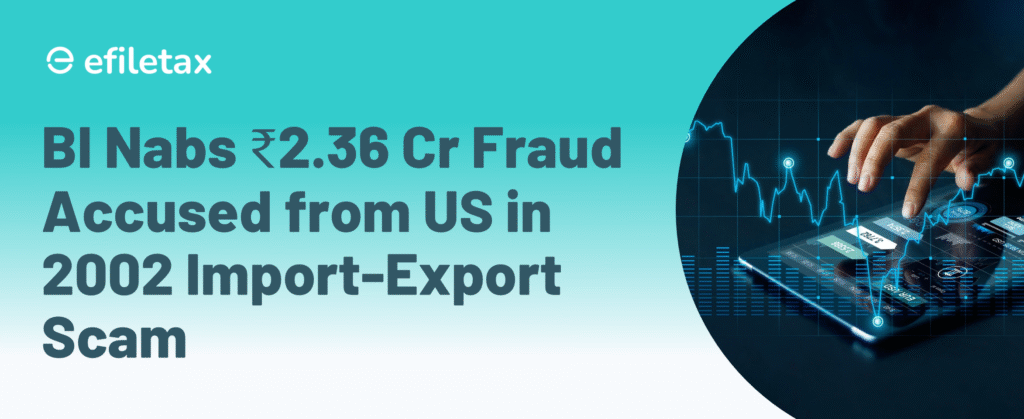
Import-Export Fraud Case: Fugitive Extradited to India After 22 Years
In a major development in India’s fight against economic offenders, a fugitive accused in a ₹2.36 crore import-export fraud from 2002 has been extradited from the United States. This marks a significant success for Indian authorities under bilateral treaties and FEMA enforcement.
The case highlights how import-export fraud — once considered a low-risk white-collar offence — is now under serious global scrutiny.
What Was the ₹2.36 Crore Fraud Case About?
According to official sources from the Central Bureau of Investigation (CBI) and Directorate of Enforcement (ED), the accused allegedly:
- Used forged import documents to claim duty exemptions
- Violated Foreign Exchange Management Act (FEMA), 1999 provisions
- Routed foreign currency transactions through illegal channels
- Caused a loss of ₹2.36 crore to Indian exchequer
The fraudulent transactions took place in 2002 under the guise of an import-export business based in Gujarat. The accused fled to the USA shortly after the investigation began.
Extradition from USA: How Did It Happen?
India’s CBI and Ministry of External Affairs worked with the US Department of Justice to process the extradition request under the India–US Extradition Treaty (1997).
Here’s how the process unfolded:
| Stage | Details |
|---|---|
| Request Filed by India | Based on Non-Bailable Warrant, Red Corner Notice |
| US Court Review | Verified criminality under dual offence principle |
| US Government Approval | Allowed surrender for prosecution in India |
| Extradition Executed | Accused brought to India in July 2025 |
Legal Basis: Section 19 of the Extradition Act, 1962 and Articles of the treaty allowed the Indian government to pursue the case across borders.
FEMA & Tax Implications for Indian Businesses
This case underlines serious compliance gaps in import-export fraud cases and their consequences under:
FEMA, 1999
- Sections 3 and 4: Prohibits unauthorised dealings in foreign exchange
- Section 13: Penalty up to 3x the amount involved + confiscation
Income-tax Act, 1961
- Section 68/69C: Unexplained credits or expenditure may trigger tax demand
- Prosecution under Sections 276C or 277 if deliberate concealment is proved
Expert Tip: Cross-Border Fraud Is Not “Forgiven by Time”
According to retired Enforcement Directorate officials, the case proves that:
“Economic crimes may not show up in day-to-day policing, but when they involve forex violations, tax evasion, or trade misrepresentation, they leave a digital footprint. Technology and treaties now make extradition and asset tracing easier than ever.”
Red Flags to Avoid Import-Export Fraud Accusations
Whether you’re an exporter, importer, or consultant, watch for these red flags:
- Using over/under-invoicing to shift money abroad
- Submitting forged shipping bills or BOE
- Failing to repatriate export proceeds within RBI timelines
- Receiving payments from unrelated foreign entities
- Non-disclosure of foreign assets in ITR (Schedule FA)
Penalty Alert: Under FEMA and Income-tax Act, non-disclosure of foreign assets can attract both monetary penalties and jail terms.
How Can Efiletax Help?
At Efiletax, we help small businesses, startups, and professionals stay 100% compliant with:
- FEMA declarations (Form FC-GPR, FLA, etc.)
- RBI and DGFT compliance
- ITR filing with Schedule FA
- International Taxation & Transfer Pricing
Avoid becoming a case study in non-compliance. Let Efiletax handle your cross-border risks.
FAQs
Q1. What is import-export fraud in India?
Import-export fraud refers to falsifying documents, under-invoicing, or misusing schemes to evade customs duty, taxes, or FEMA rules.
Q2. Can someone be prosecuted under both FEMA and Income Tax Act?
Yes. FEMA deals with forex violations while the Income-tax Act covers undisclosed income. Both can run parallel.
Q3. What is the time limit for prosecution in FEMA cases?
There is no specific limitation under FEMA. Enforcement Directorate can initiate action even after a decade, as seen in this case.
Q4. Is Schedule FA mandatory in ITR?
Yes, if you hold foreign assets or income, you must declare them in Schedule FA of ITR-2 or ITR-3.
Summary
A 2002 import-export fraud accused has been extradited from the USA to India in a ₹2.36 crore FEMA case. This highlights the growing crackdown on cross-border economic crimes, tax evasion, and misuse of trade documents. Learn how businesses can stay compliant under FEMA and Income Tax Act.